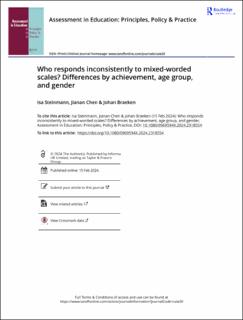Who Responds Inconsistently to Mixed-Worded Scales? Differences by Achievement, Age Group, and Gender
Journal article, Peer reviewed
Published version
Permanent lenke
https://hdl.handle.net/11250/3118987Utgivelsesdato
2024Metadata
Vis full innførselSamlinger
Originalversjon
https://doi.org/10.1080/0969594X.2024.2318554Sammendrag
We investigated two research questions: which students are more likely to respond inconsistently to mixed-worded questionnaire scales, and which country samples have larger shares of inconsistent respondents? We defined an inconsistent response as strongly agree- ing or disagreeing with both positively and negatively worded items of the same scale. Since we assumed that inconsistent responding occurs due to a lack of carefulness, reading, or cognitive skills, we expected to find that inconsistent responding was associated with lower achievement, younger age, being a nonnative speaker, and being a boy. We used data from all 38 countries that participated in the fourth- and eighth-grade assessments of TIMSS (Trends in International Mathematics and Science Study) 2019. Using the mean absolute difference method, we identified shares of 1‒21% inconsistent respondents across samples. The results generally sup- ported our hypotheses, especially the hypothesis that inconsistent responding is more common among students and countries with lower mathematics achievement levels.

